BM202: Reflecting on Motivating Behaviour in the Workplace
VerifiedAdded on 2020/03/23
|6
|1279
|56
Report
AI Summary
This report is a reflective analysis of employee motivation within an organisational context. The student begins by recounting a personal experience where a lack of motivation led to an employee's poor performance and eventual departure. The report then delves into the significance of motivation as a key driver of employee engagement and organisational productivity, highlighting the costs associated with employee turnover. Several motivational theories are explored, including Maslow's hierarchy of needs and Herzberg's two-factor theory, with an emphasis on the importance of both intrinsic and extrinsic motivators. The analysis of the selected experience underscores the need for effective human resource practices, including proper job design and recognition of employee skills. The report concludes by emphasizing the application of motivational theories to improve employee work performance and foster a positive organisational climate. References to relevant academic sources are provided.
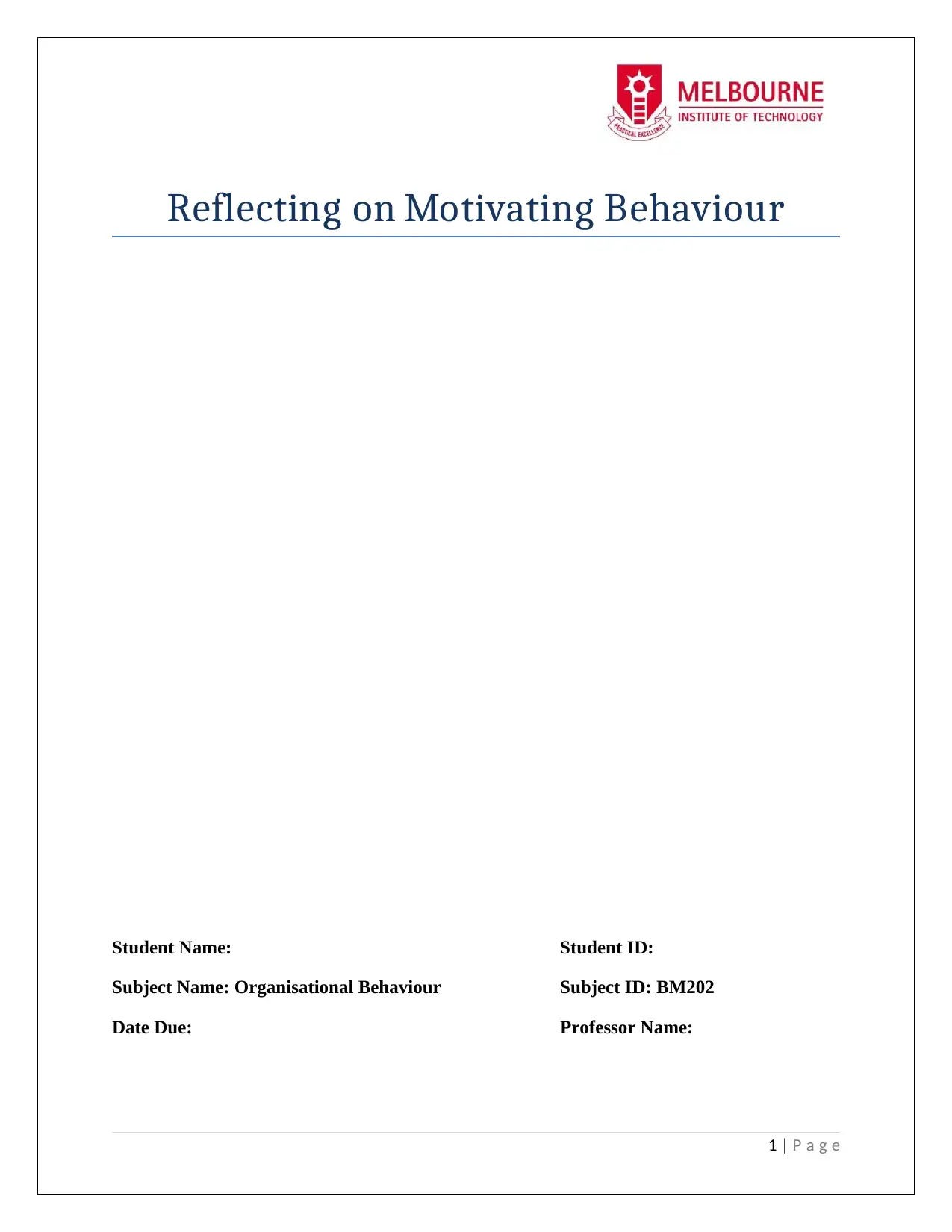
Reflecting on Motivating Behaviour
Student Name: Student ID:
Subject Name: Organisational Behaviour Subject ID: BM202
Date Due: Professor Name:
1 | P a g e
Student Name: Student ID:
Subject Name: Organisational Behaviour Subject ID: BM202
Date Due: Professor Name:
1 | P a g e
Paraphrase This Document
Need a fresh take? Get an instant paraphrase of this document with our AI Paraphraser
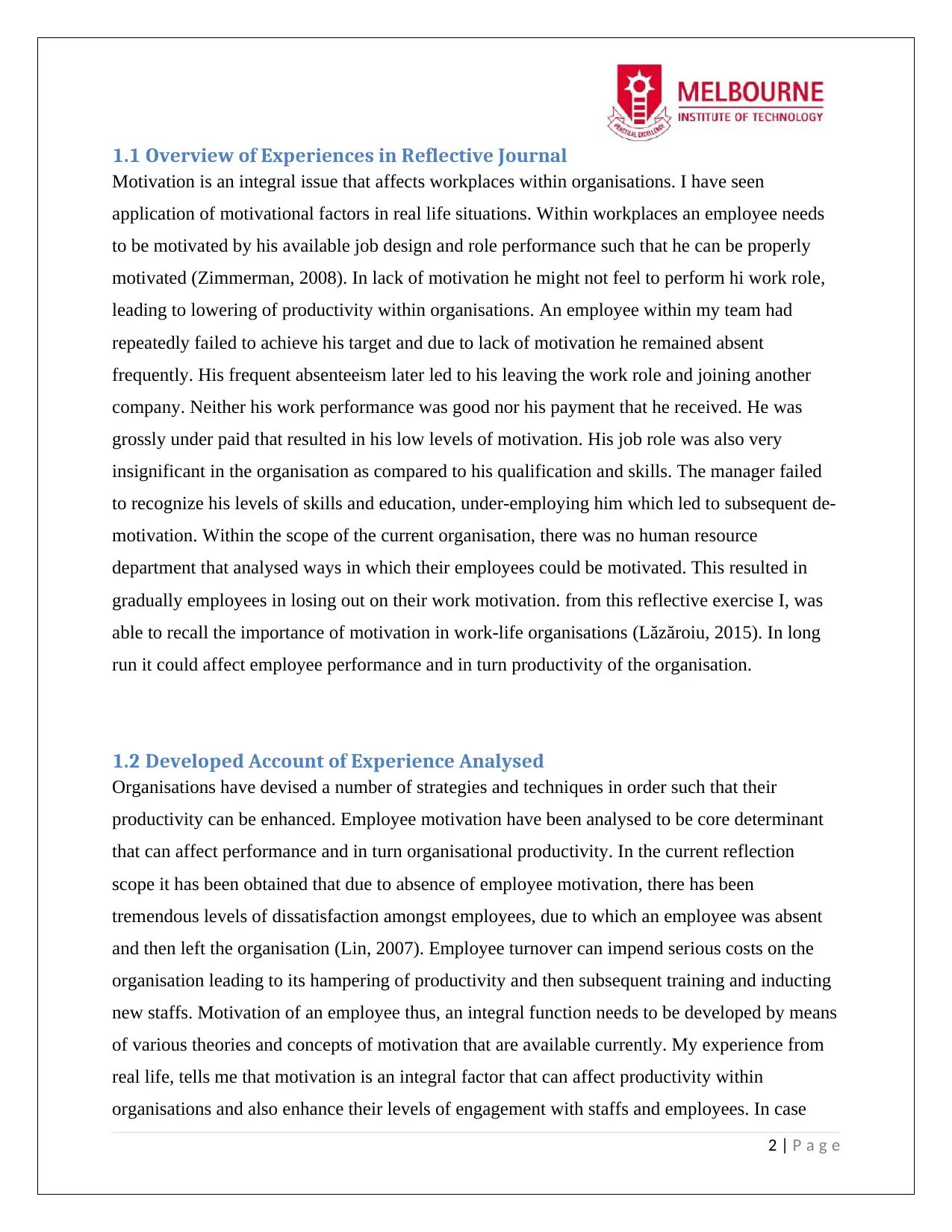
1.1 Overview of Experiences in Reflective Journal
Motivation is an integral issue that affects workplaces within organisations. I have seen
application of motivational factors in real life situations. Within workplaces an employee needs
to be motivated by his available job design and role performance such that he can be properly
motivated (Zimmerman, 2008). In lack of motivation he might not feel to perform hi work role,
leading to lowering of productivity within organisations. An employee within my team had
repeatedly failed to achieve his target and due to lack of motivation he remained absent
frequently. His frequent absenteeism later led to his leaving the work role and joining another
company. Neither his work performance was good nor his payment that he received. He was
grossly under paid that resulted in his low levels of motivation. His job role was also very
insignificant in the organisation as compared to his qualification and skills. The manager failed
to recognize his levels of skills and education, under-employing him which led to subsequent de-
motivation. Within the scope of the current organisation, there was no human resource
department that analysed ways in which their employees could be motivated. This resulted in
gradually employees in losing out on their work motivation. from this reflective exercise I, was
able to recall the importance of motivation in work-life organisations (Lăzăroiu, 2015). In long
run it could affect employee performance and in turn productivity of the organisation.
1.2 Developed Account of Experience Analysed
Organisations have devised a number of strategies and techniques in order such that their
productivity can be enhanced. Employee motivation have been analysed to be core determinant
that can affect performance and in turn organisational productivity. In the current reflection
scope it has been obtained that due to absence of employee motivation, there has been
tremendous levels of dissatisfaction amongst employees, due to which an employee was absent
and then left the organisation (Lin, 2007). Employee turnover can impend serious costs on the
organisation leading to its hampering of productivity and then subsequent training and inducting
new staffs. Motivation of an employee thus, an integral function needs to be developed by means
of various theories and concepts of motivation that are available currently. My experience from
real life, tells me that motivation is an integral factor that can affect productivity within
organisations and also enhance their levels of engagement with staffs and employees. In case
2 | P a g e
Motivation is an integral issue that affects workplaces within organisations. I have seen
application of motivational factors in real life situations. Within workplaces an employee needs
to be motivated by his available job design and role performance such that he can be properly
motivated (Zimmerman, 2008). In lack of motivation he might not feel to perform hi work role,
leading to lowering of productivity within organisations. An employee within my team had
repeatedly failed to achieve his target and due to lack of motivation he remained absent
frequently. His frequent absenteeism later led to his leaving the work role and joining another
company. Neither his work performance was good nor his payment that he received. He was
grossly under paid that resulted in his low levels of motivation. His job role was also very
insignificant in the organisation as compared to his qualification and skills. The manager failed
to recognize his levels of skills and education, under-employing him which led to subsequent de-
motivation. Within the scope of the current organisation, there was no human resource
department that analysed ways in which their employees could be motivated. This resulted in
gradually employees in losing out on their work motivation. from this reflective exercise I, was
able to recall the importance of motivation in work-life organisations (Lăzăroiu, 2015). In long
run it could affect employee performance and in turn productivity of the organisation.
1.2 Developed Account of Experience Analysed
Organisations have devised a number of strategies and techniques in order such that their
productivity can be enhanced. Employee motivation have been analysed to be core determinant
that can affect performance and in turn organisational productivity. In the current reflection
scope it has been obtained that due to absence of employee motivation, there has been
tremendous levels of dissatisfaction amongst employees, due to which an employee was absent
and then left the organisation (Lin, 2007). Employee turnover can impend serious costs on the
organisation leading to its hampering of productivity and then subsequent training and inducting
new staffs. Motivation of an employee thus, an integral function needs to be developed by means
of various theories and concepts of motivation that are available currently. My experience from
real life, tells me that motivation is an integral factor that can affect productivity within
organisations and also enhance their levels of engagement with staffs and employees. In case
2 | P a g e
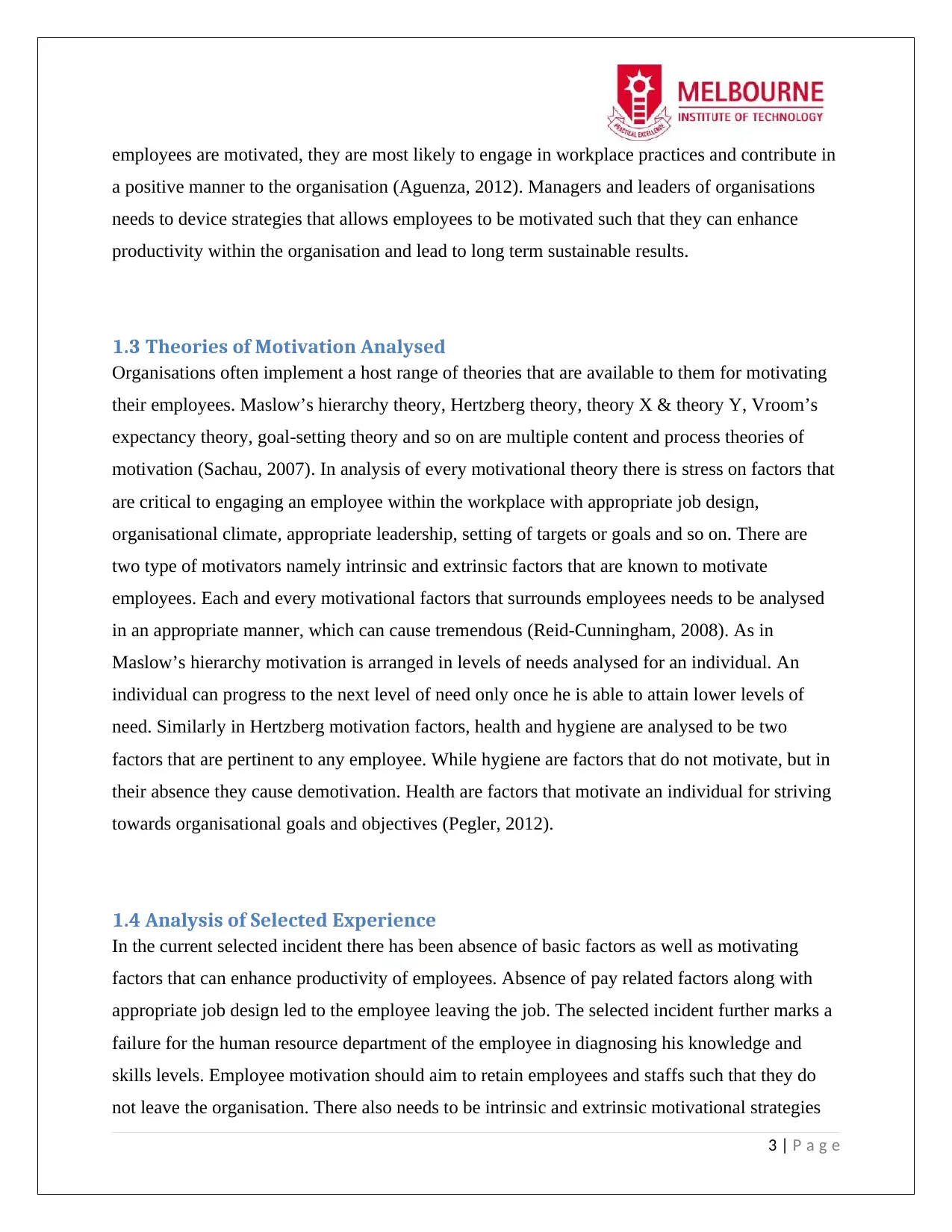
employees are motivated, they are most likely to engage in workplace practices and contribute in
a positive manner to the organisation (Aguenza, 2012). Managers and leaders of organisations
needs to device strategies that allows employees to be motivated such that they can enhance
productivity within the organisation and lead to long term sustainable results.
1.3 Theories of Motivation Analysed
Organisations often implement a host range of theories that are available to them for motivating
their employees. Maslow’s hierarchy theory, Hertzberg theory, theory X & theory Y, Vroom’s
expectancy theory, goal-setting theory and so on are multiple content and process theories of
motivation (Sachau, 2007). In analysis of every motivational theory there is stress on factors that
are critical to engaging an employee within the workplace with appropriate job design,
organisational climate, appropriate leadership, setting of targets or goals and so on. There are
two type of motivators namely intrinsic and extrinsic factors that are known to motivate
employees. Each and every motivational factors that surrounds employees needs to be analysed
in an appropriate manner, which can cause tremendous (Reid-Cunningham, 2008). As in
Maslow’s hierarchy motivation is arranged in levels of needs analysed for an individual. An
individual can progress to the next level of need only once he is able to attain lower levels of
need. Similarly in Hertzberg motivation factors, health and hygiene are analysed to be two
factors that are pertinent to any employee. While hygiene are factors that do not motivate, but in
their absence they cause demotivation. Health are factors that motivate an individual for striving
towards organisational goals and objectives (Pegler, 2012).
1.4 Analysis of Selected Experience
In the current selected incident there has been absence of basic factors as well as motivating
factors that can enhance productivity of employees. Absence of pay related factors along with
appropriate job design led to the employee leaving the job. The selected incident further marks a
failure for the human resource department of the employee in diagnosing his knowledge and
skills levels. Employee motivation should aim to retain employees and staffs such that they do
not leave the organisation. There also needs to be intrinsic and extrinsic motivational strategies
3 | P a g e
a positive manner to the organisation (Aguenza, 2012). Managers and leaders of organisations
needs to device strategies that allows employees to be motivated such that they can enhance
productivity within the organisation and lead to long term sustainable results.
1.3 Theories of Motivation Analysed
Organisations often implement a host range of theories that are available to them for motivating
their employees. Maslow’s hierarchy theory, Hertzberg theory, theory X & theory Y, Vroom’s
expectancy theory, goal-setting theory and so on are multiple content and process theories of
motivation (Sachau, 2007). In analysis of every motivational theory there is stress on factors that
are critical to engaging an employee within the workplace with appropriate job design,
organisational climate, appropriate leadership, setting of targets or goals and so on. There are
two type of motivators namely intrinsic and extrinsic factors that are known to motivate
employees. Each and every motivational factors that surrounds employees needs to be analysed
in an appropriate manner, which can cause tremendous (Reid-Cunningham, 2008). As in
Maslow’s hierarchy motivation is arranged in levels of needs analysed for an individual. An
individual can progress to the next level of need only once he is able to attain lower levels of
need. Similarly in Hertzberg motivation factors, health and hygiene are analysed to be two
factors that are pertinent to any employee. While hygiene are factors that do not motivate, but in
their absence they cause demotivation. Health are factors that motivate an individual for striving
towards organisational goals and objectives (Pegler, 2012).
1.4 Analysis of Selected Experience
In the current selected incident there has been absence of basic factors as well as motivating
factors that can enhance productivity of employees. Absence of pay related factors along with
appropriate job design led to the employee leaving the job. The selected incident further marks a
failure for the human resource department of the employee in diagnosing his knowledge and
skills levels. Employee motivation should aim to retain employees and staffs such that they do
not leave the organisation. There also needs to be intrinsic and extrinsic motivational strategies
3 | P a g e
⊘ This is a preview!⊘
Do you want full access?
Subscribe today to unlock all pages.

Trusted by 1+ million students worldwide
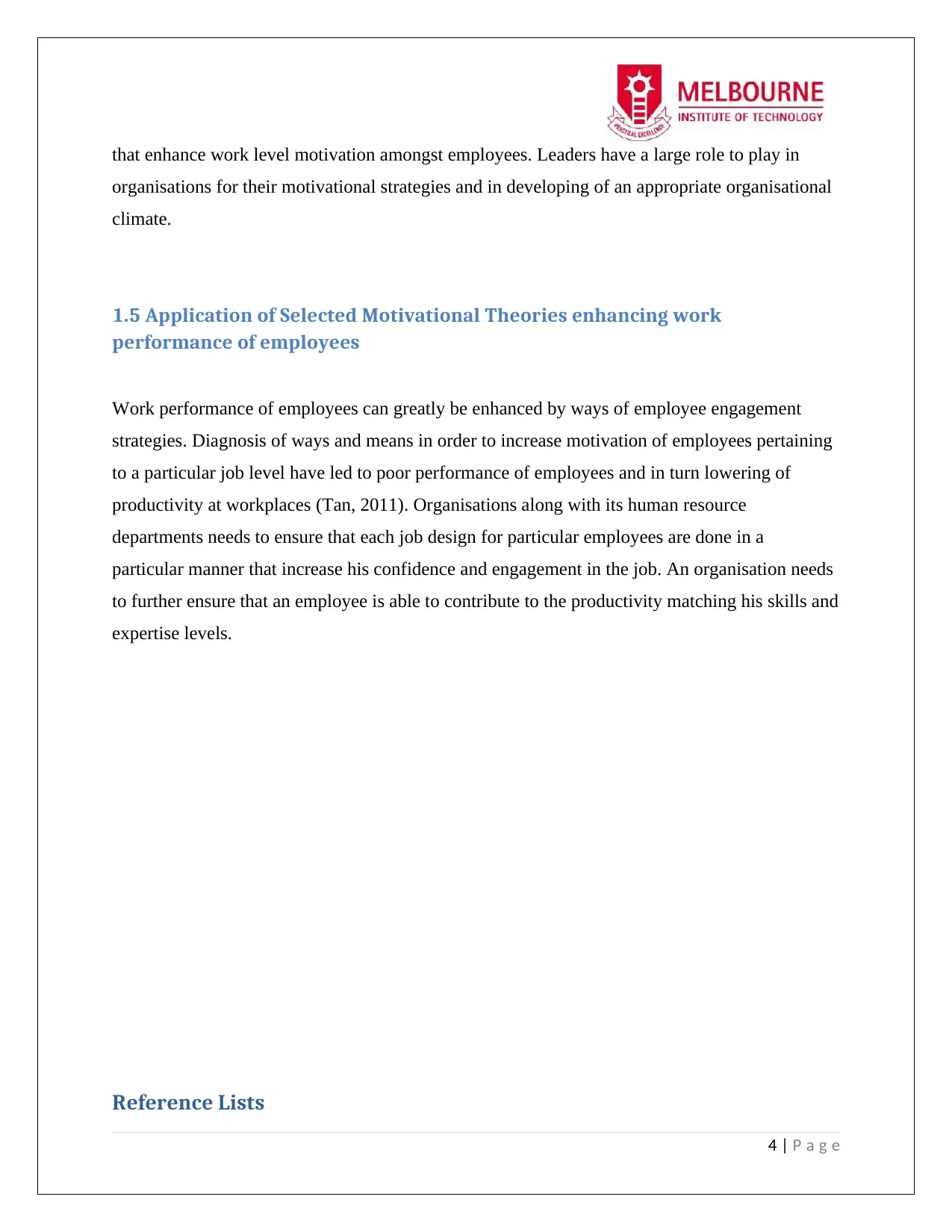
that enhance work level motivation amongst employees. Leaders have a large role to play in
organisations for their motivational strategies and in developing of an appropriate organisational
climate.
1.5 Application of Selected Motivational Theories enhancing work
performance of employees
Work performance of employees can greatly be enhanced by ways of employee engagement
strategies. Diagnosis of ways and means in order to increase motivation of employees pertaining
to a particular job level have led to poor performance of employees and in turn lowering of
productivity at workplaces (Tan, 2011). Organisations along with its human resource
departments needs to ensure that each job design for particular employees are done in a
particular manner that increase his confidence and engagement in the job. An organisation needs
to further ensure that an employee is able to contribute to the productivity matching his skills and
expertise levels.
Reference Lists
4 | P a g e
organisations for their motivational strategies and in developing of an appropriate organisational
climate.
1.5 Application of Selected Motivational Theories enhancing work
performance of employees
Work performance of employees can greatly be enhanced by ways of employee engagement
strategies. Diagnosis of ways and means in order to increase motivation of employees pertaining
to a particular job level have led to poor performance of employees and in turn lowering of
productivity at workplaces (Tan, 2011). Organisations along with its human resource
departments needs to ensure that each job design for particular employees are done in a
particular manner that increase his confidence and engagement in the job. An organisation needs
to further ensure that an employee is able to contribute to the productivity matching his skills and
expertise levels.
Reference Lists
4 | P a g e
Paraphrase This Document
Need a fresh take? Get an instant paraphrase of this document with our AI Paraphraser
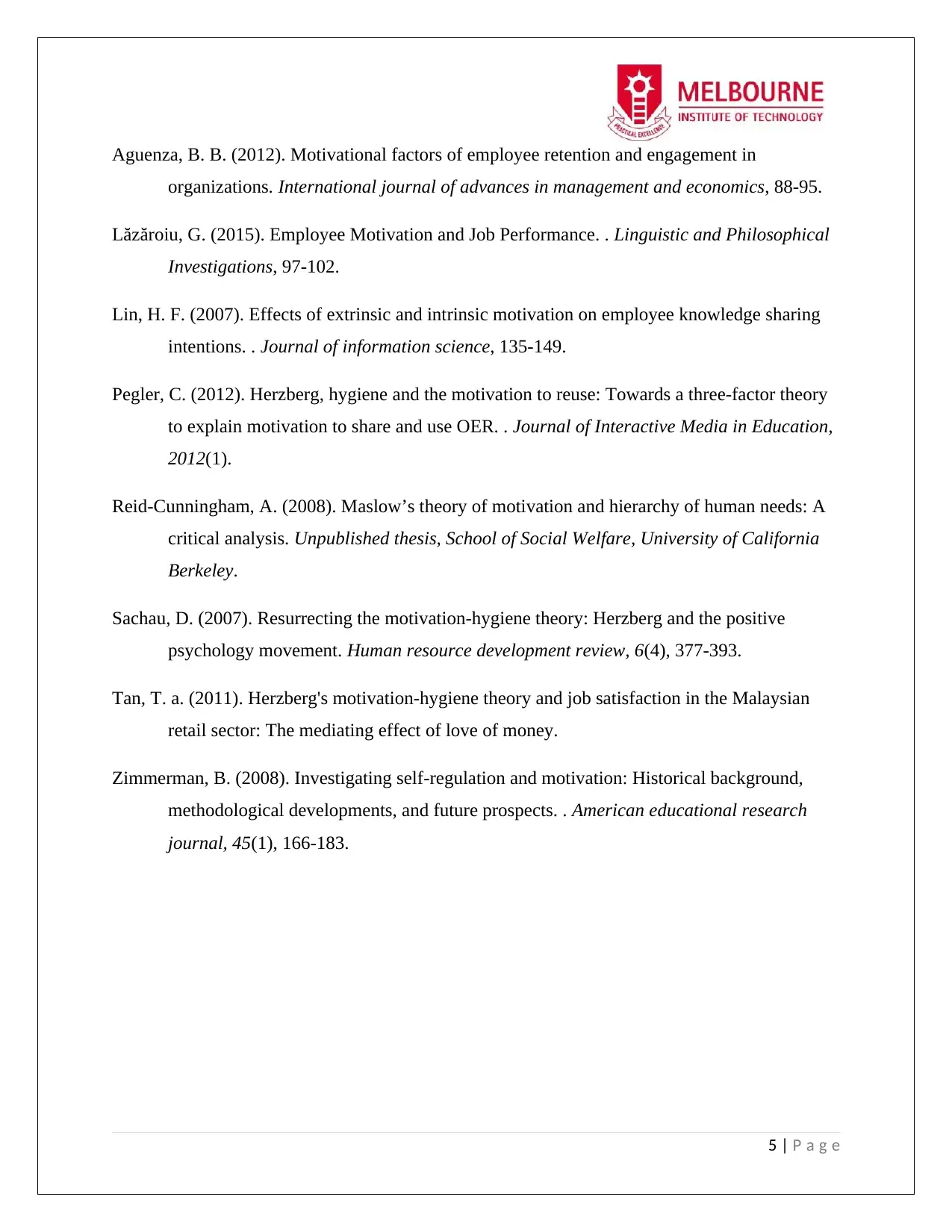
Aguenza, B. B. (2012). Motivational factors of employee retention and engagement in
organizations. International journal of advances in management and economics, 88-95.
Lăzăroiu, G. (2015). Employee Motivation and Job Performance. . Linguistic and Philosophical
Investigations, 97-102.
Lin, H. F. (2007). Effects of extrinsic and intrinsic motivation on employee knowledge sharing
intentions. . Journal of information science, 135-149.
Pegler, C. (2012). Herzberg, hygiene and the motivation to reuse: Towards a three-factor theory
to explain motivation to share and use OER. . Journal of Interactive Media in Education,
2012(1).
Reid-Cunningham, A. (2008). Maslow’s theory of motivation and hierarchy of human needs: A
critical analysis. Unpublished thesis, School of Social Welfare, University of California
Berkeley.
Sachau, D. (2007). Resurrecting the motivation-hygiene theory: Herzberg and the positive
psychology movement. Human resource development review, 6(4), 377-393.
Tan, T. a. (2011). Herzberg's motivation-hygiene theory and job satisfaction in the Malaysian
retail sector: The mediating effect of love of money.
Zimmerman, B. (2008). Investigating self-regulation and motivation: Historical background,
methodological developments, and future prospects. . American educational research
journal, 45(1), 166-183.
5 | P a g e
organizations. International journal of advances in management and economics, 88-95.
Lăzăroiu, G. (2015). Employee Motivation and Job Performance. . Linguistic and Philosophical
Investigations, 97-102.
Lin, H. F. (2007). Effects of extrinsic and intrinsic motivation on employee knowledge sharing
intentions. . Journal of information science, 135-149.
Pegler, C. (2012). Herzberg, hygiene and the motivation to reuse: Towards a three-factor theory
to explain motivation to share and use OER. . Journal of Interactive Media in Education,
2012(1).
Reid-Cunningham, A. (2008). Maslow’s theory of motivation and hierarchy of human needs: A
critical analysis. Unpublished thesis, School of Social Welfare, University of California
Berkeley.
Sachau, D. (2007). Resurrecting the motivation-hygiene theory: Herzberg and the positive
psychology movement. Human resource development review, 6(4), 377-393.
Tan, T. a. (2011). Herzberg's motivation-hygiene theory and job satisfaction in the Malaysian
retail sector: The mediating effect of love of money.
Zimmerman, B. (2008). Investigating self-regulation and motivation: Historical background,
methodological developments, and future prospects. . American educational research
journal, 45(1), 166-183.
5 | P a g e

6 | P a g e
⊘ This is a preview!⊘
Do you want full access?
Subscribe today to unlock all pages.

Trusted by 1+ million students worldwide
1 out of 6
Related Documents
Your All-in-One AI-Powered Toolkit for Academic Success.
+13062052269
info@desklib.com
Available 24*7 on WhatsApp / Email
![[object Object]](/_next/static/media/star-bottom.7253800d.svg)
Unlock your academic potential
Copyright © 2020–2026 A2Z Services. All Rights Reserved. Developed and managed by ZUCOL.



